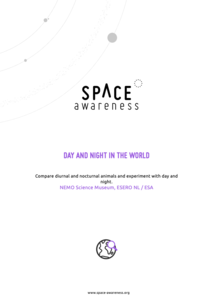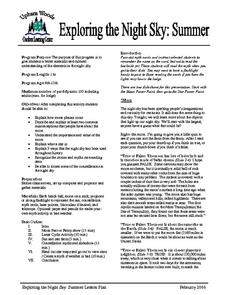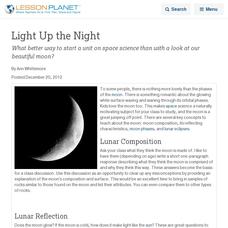Curated OER
Lights in the Night Sky
Learners read about and explore solar winds and spectacular auroras, specifically the Aurora Borealis, also known as the Northern Lights.
Star Date
Modeling the Night Sky
Dramatize the stars and planets as they become a visual representation of the solar system in this activity. Young astronomers track and simulate various constellations as they orbit the Earth to learn the position and motion of objects...
Space Awareness
Day and Night in the World
How do different parts of the world experience day and night? Introduce scholars to the concept of global citizenship while teaching about animal behavior with discussion of nocturnal and diurnal animals. Then, learners complete...
California Academy of Science
Kinesthetic Astronomy: Longer Days, Shorter Nights
A lamp, four globes, and some signs taped around the room are all you need to set up a solar system simulation for teaching how Earth's tilted axis creates the seasons. (Sticky dots are also needed, but not mentioned in the materials...
Curated OER
Exploring the Night Sky: Summer
Students explain how moon phases occur. They describe and explain at least two common misconceptions that people have about the moon. Students explain what a star is. They explain 3 ways that the night sky has been used throughout history.
Curated OER
Day and Night
Expand your third graders' universe with a science activity about Earth's rotation. They read a short explanation about the direction of sunlight, then draw an arrow to indicate which way the sun is pointed at an illustration of the...
NASA
Blinded by the Light!
Pupils learn of multiple ways astronomers look for planets outside of the solar system. By completing a hands-on activity, scholars discover that trying to see the planets directly because of the glare from the nearby star is nearly...
Curated OER
Excite the Night with a Look at the Moon
What better way to start a unit on space science than with a look at our beautiful moon?
International Technology Education Association
Tidy Up Those Sloppy Force Fields!
It is just magnetic. This resource presents the concept of Earth's and another planet's magnetic field and how spacecrafts detect them. Learners study a problem using magnetometers and participate in three experiments to come up with a...
International Technology Education Association
Singin' the Black and Blues
How does the color of the sky change from blue to reds and oranges to black? An illuminating lesson explains how light travels through different mediums using the sun's light as an example. By examining diagrams and illustrations, pupils...
Science 4 Inquiry
The Yin and Yang of Photosynthesis: Day vs. Night
Floating fragments of elodea can grow even without roots. Young scientists use eldoea plants to observe the oxygen production from photosynthesis. They study the difference between having access to high amounts of light and low amounts...
Spark Notes
The Unbearable Lightness of Being by Milan Kundera: Study Guide - Mini Essays
In this online interactive literature worksheet, students respond to 8 short answer and essay questions about Milan Kundera's The Unbearable Lightness of Being. Students may check some of their answers online.
Curated OER
Let's Think About Day and Night
Students explore day and night and the relationships between the Earth, the sun and the moon. They discuss the ways in which the sun and moon help us. They watch a short video that helps illustrate these concepts.
Curated OER
Wrap It Up for Chanukah!
Prepare gifts for the eight nights of Hanukkah with a fun and artistic lesson. Learners use various materials to make an array of unique gifts, including splatter paintings, decorated flowerpots, and stained glass designed with crayons.
Into Films
Filmmaking Guide
Pixar, DreamWorks, Disney Studios. Prepare your primary graders to become the next generation of film makers with a guide that encourages kids to explore the possibilities of script writing, lighting, sound, editing, and post production...
Curated OER
Ranger Rick's Observing Night Lights
In this Ranger Rick's observing night lights worksheet, students observe and record the lights in their neighborhood at night and the effect on the environment.
Curated OER
Dark Nights-Nature Notebook
In this night time worksheet, students complete a graphic organizer about the night, drawing and filling in information about the night sky, the night ground, and the lights they may see.
Curated OER
The Light in the Forest Quiz
In this comprehension activity, students complete a quiz based on The Light in the Forest by Conrad Richter. Students answer 25 multiple choice questions.
Curated OER
Hot Air
Students conduct an experiment to determine how hot air affect the path of laser. In this physics lesson, students explain why stars appear to twinkle at night. They discuss how light travels from space to Earth.
Curated OER
Water Works Wonders
Students examine where water is found in the world, how we use it, and the various forms it takes. They observe the refraction of light through a prism, record the day and night sky over a week's time, and create a topographic model of...
Curated OER
DAY AND NIGHT
Students use a lamp as the sun and his/her body as the earth. They rotate in different directions to explain how the earth moves around the sun. Using specific questions in their discussion, students discover the reasons for day and night.
West Contra Costa Unified School District
Arithmetic Series
Fall for a series. Learners determine how to find out how far a skydiver falls in the first 20 seconds. The Algebra II lesson introduces the idea of adding up the terms of an arithmetic sequence. Pupils learn how to use Sigma notation to...
American Museum of Natural History
A Kid's Guide to Stargazing
Get kids interested in stargazing with a step-by-step guide. The guide begins with the do's and don'ts, what the defines a star, and introduces a journal. The page is linked to see stars if light pollution keeps stars away in your area.
Road to Grammar
The Unexplained
Are you afraid of what goes bump in the night? Talk about the supernatural with your English language learners to find out their beliefs while practicing speaking skills. Learners read three different viewpoints on the paranormal and...

























